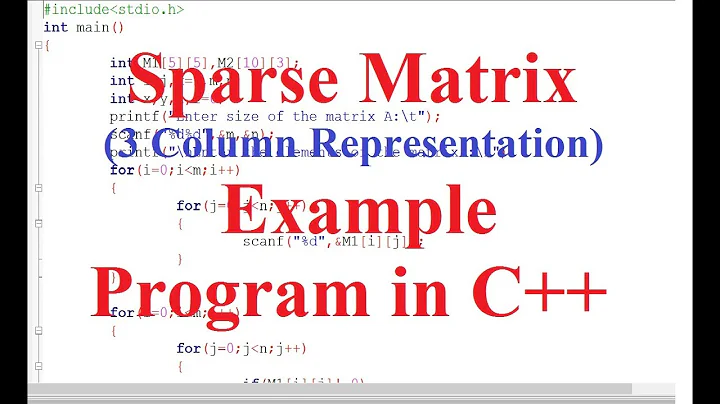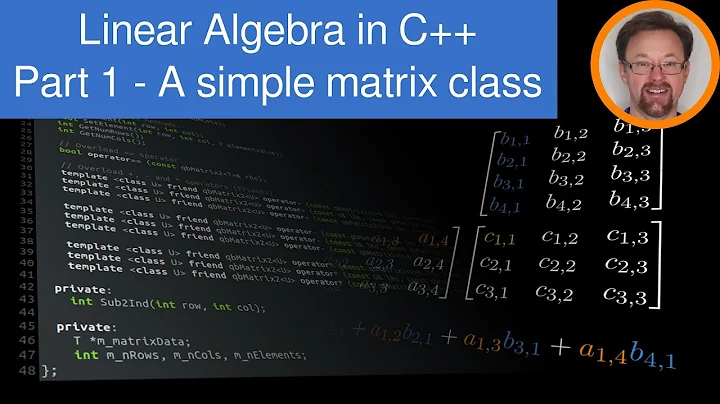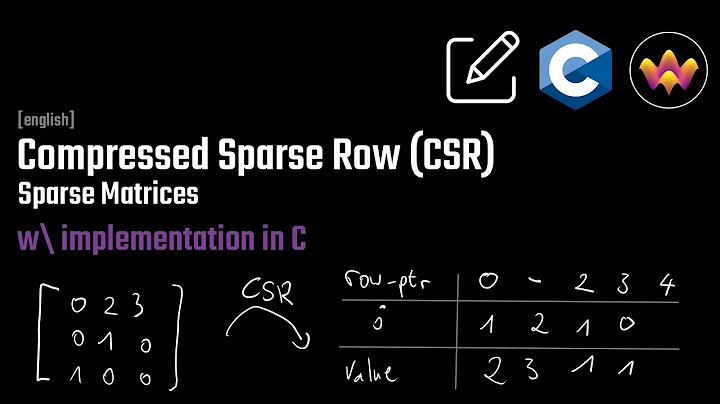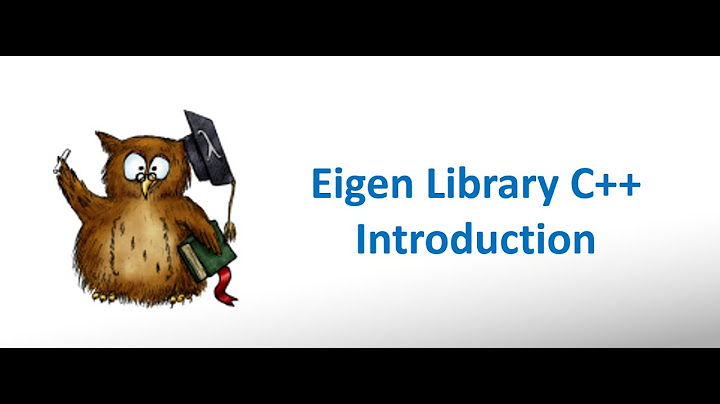Best C++ Matrix Library for sparse unitary matrices
Solution 1
Many people doing "serious" matrix stuff, rely on BLAS, adding LAPACK / ATLAS (normal matrices) or UMFPACK (sparse matrices) for more advanced math. The reason is that this code is well-tested, stable, reliable, and quite fast. Furthermore, you can buy them directly from a vendor (e.g. Intel MKL) tuned towards your architecture, but also get them for free. uBLAS mentioned in Manuel's answer is probably the standard C++ BLAS implementation. And if you need something like LAPACK later on, there are bindings to do so.
However, none of these standard libraries (BLAS / LAPACK / ATLAS or uBLAS + bindings + LAPACK / ATLAS) ticks your box for being templated and easy to use (unless uBLAS is all you'll ever need). Actually, I must admit, that I tend to call the C / Fortran interface directly when I use a BLAS / LAPACK implementation, since I often don't see much additional advantage in the uBLAS + bindings combination.
If I a need a simple-to-use, general-purpose C++ matrix library, I tend to use Eigen (I used to use NewMat in the past). Advantages:
- quite fast on Intel architecture, probably the fastest for smaller matrices
- nice interface
- almost everything you expect from a matrix library
- you can easily add new types
Disadvantages (IMO):
- single-processor [Edit: partly fixed in Eigen 3.0]
- slower for larger matrices and some advanced math than ATLAS or Intel MKL (e.g. LU decomposition) [Edit: also improved in Eigen 3.0]
- only experimental support for sparse matrices [Edit: improved in upcoming version 3.1].
Edit: The upcoming Eigen 3.1 allows some functions to use the Intel MKL (or any other BLAS / LAPACK implementation).
Solution 2
Boost uBLAS, because it's passed the Boost filter.
There are a few template libs that support sparse matrices, so it's really hard to come up with a better rationale if you're not more specific about your needs.
Solution 3
You should also try MLT and HASEM Matrix C++ Library. The last one is very well documented.
Related videos on Youtube
Mathias Soeken
Researcher and software developer Working at Microsoft Quantum
Updated on April 15, 2022Comments
-
 Mathias Soeken about 2 years
Mathias Soeken about 2 yearsI am looking for a good (in the best case actively maintained) C++ matrix library. Thereby it should be templated, because I want to use a complex of rationals as numerical type. The matrices what I am dealing with are mainly sparse and unitary.
Can you please suggest libraries and also give a small explaination why to use them, because I know how to find them, but I cannot really decide what is suitable for me because I am missing the experience with them.
EDIT:
The main operations I am dealing with are matrix multiplication, scalar multiplication with a vector and kronecker product. The size of the matrices is exponential and I wanna at least be able to deal with matrices up to 1024x1024 entries.
-
Manuel about 14 yearsOne obvious advantage of a C++ wrapper is the performance gain provided by expression templates
-
stephan about 14 years@Manuel: agree. Avoiding temps is the main promise of matrix template libraries like oonumerics.org/blitz, osl.iu.edu/research/mtl, etc. But you can do most of this in C code, too, since BLAS routines do not copy matrices but work in-place where possible.
-
Manuel about 14 yearsyou can spare some temporaries by doing everything in place but there are other things that expression templates optimize. For example, in a C library if you do add(A, add(B, add(C, D))) then the intermediate results must be computed, and each step involves a loop, so in total you have 3 loops. With expression templates the result is only evaluated once: 1 loop.
-
Sard over 13 yearsEigen seems to use right to left multiplication which is a bit strange.
-
 rcollyer about 12 yearsuBLAS isn't a wrapper, it's wholly implemented in c++.
rcollyer about 12 yearsuBLAS isn't a wrapper, it's wholly implemented in c++. -
stephan about 12 years@rcollyer: thanks for your input. This was indeed wrongly worded. I am surprised that you are the first person to correct me on this error. The only apology I can give is that I have always used uBLAS in combination with the bindings (hence my "wrapper" perception), which (as mentioned) wasn't my favorite approach. But you are right -- and I should have remembered, because one of the reasons we opted against uBLAS was that uBLAS
prodwas substantially slower for larger dense matrices than ATLASgemm(IIRC, Intel MKL overloadsprodwithgemmcalls for this reason). -
 rcollyer about 12 yearsI've never used the wrapper functionality myself, as I rejected its use because I need access to the internal representation, nor could I figure out how to bolt on the functionality I needed. So, I went with codesourcery's VSIPL++ implementation.
rcollyer about 12 yearsI've never used the wrapper functionality myself, as I rejected its use because I need access to the internal representation, nor could I figure out how to bolt on the functionality I needed. So, I went with codesourcery's VSIPL++ implementation.









